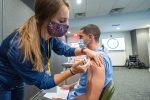With no candidates, what’s on the ballot?
From staff reports
There may not be any human candidates running in this November’s election, but Caldwell County voters will still be able to cast a ballot on eight proposed amendments to the state Constitution.
Early voting for the Nov. 2 election began Monday and is currently underway at the Scott Annex, the Luling Civic Center (closed Oct. 22-23) and Three Rivers Community Church in Martindale.
Early voting will run from 8 a.m.-5 p.m. through Oct. 23, from 8 a.m.-5 p.m. Oct. 25-27, and from 7 a.m.-7 p.m. Oct. 28-29.
The proposed additions to the Texas Constitution were passed as bills during this year’s legislative session, and a majority of voters in the state must approve each amendment before it can be officially added to the Constitution. In 2017, Texas voters approved all seven amendments on the ballot; in 2019, voters greenlit nine out of 10 proposed changes.
Proposition 1 would allow charitable raffles at rodeo events. Unauthorized raffles can be considered illegal gambling under Texas law.
Proposition 2 would authorize counties to issue bonds or notes to raise funds for transportation infrastructure in underdeveloped areas. Already, cities and towns have the authority to fund projects with this financing method. Counties would repay these bonds by pledging increased property tax revenues, but these funds cannot be used for construction, maintenance or acquisition of toll roads.
Proposition 3 would ban the state from prohibiting or limiting religious services. The move stems from conflicts over churches that closed during the early months of the pandemic in 2020. Some local officials extended stay-at-home orders to include places of worship, requiring them to limit attendance or make services virtual, which Gov. Greg Abbott and other Republicans pushed back on.
Proposition 4 would require candidates to have 10 years of experience practicing law in Texas to be eligible for election to the Texas Supreme Court, the Court of Criminal Appeals or a Texas court of appeals. Currently, the law requires 10 years of experience but allows for out-of-state experience.
Proposition 5 would allow the State Commission on Judicial Conduct to have oversight of candidates running for judicial seats by accepting complaints or reports, conducting investigations and reprimanding them. The commision, an independent agency created by the state Constitution, already has these powers over current judicial officeholders.
Proposition 6 would allow residents of nursing homes and assisted living facilities to designate one essential caregiver who cannot be denied in-person visitation rights. Nursing homes, which were hit particularly hard by COVID-19, saw extended visitation restrictions that prevented residents from seeing family and friends for months.
Proposition 7 would put a limit on school district property taxes incurred by the surviving spouse of a person with disabilities older than 65 who has died. The surviving spouse must be at least 55 years old at the partner’s time of death and still live in the home. The amendment is necessary to update the Constitution in accordance with the tax code, which was modified in the 2019 legislative session to include this change.
Proposition 8 would expand eligibility for residential homestead tax exemptions to include spouses of military members killed or fatally injured in the line of duty. Currently, the exemption is extended to spouses of military members killed in action. The new eligibility would include people killed in accidental vehicle crashes or non-hostile events.
The Texas Tribune contributed to this report.


